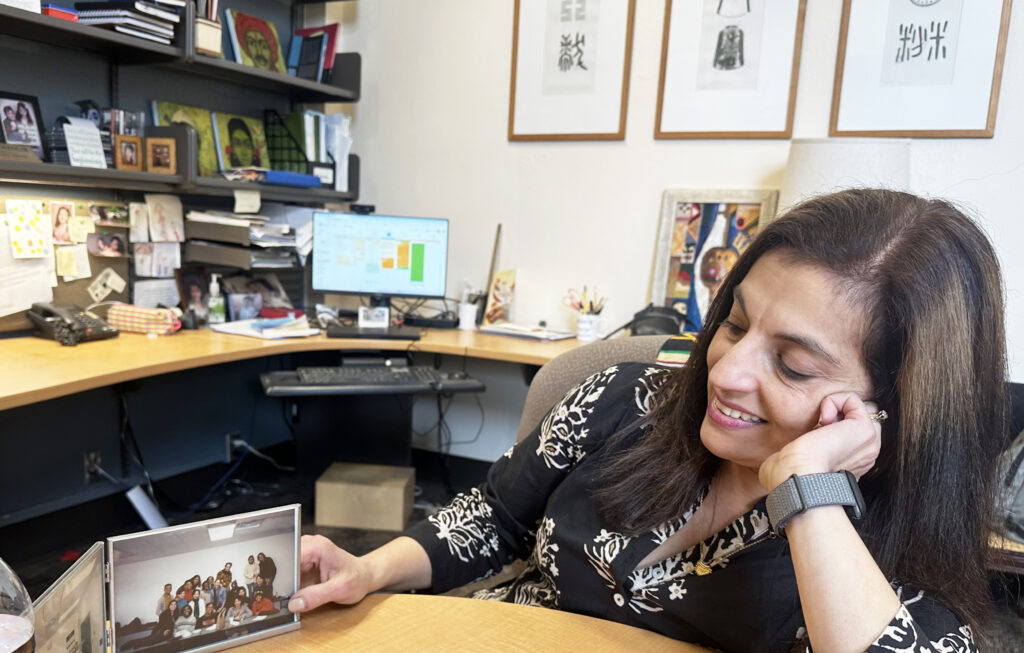Rashné Jehangir’s extraordinary care for first-generation students
Through her advocacy and achievement, the professor of higher education has become a fierce advocate for the students she believes bring many assets — not deficits.

By Ariana Valentin
Connecting with first-generation students and listening to their experiences is central to Rashné Jehangir’s mission at the University of Minnesota.
Her work began more than 20 years ago when Jehangir finished her master’s degree in counseling at the university and began working as a counselor for the General College, a two-year program on campus that gave full-college access to promising students who did not otherwise qualify. The college, which served a large number of first-generation students, closed in 2006 as the university ramped up its competitive profile as a top academic and research institution.
“Multiple times over the years, there were efforts to shut us down,” Jehangir said. “And we were a rowdy bunch. It’s part of what inspired me to do academia. We’d organize with community folks and there would always be enough of an uproar that administration would back off.”
When the General College closed, many of its faculty and programs were transferred to the College of Education and Human Development. Eventually, Jehangir would end up there as well — but not before doggedly pursuing a Ph.D. in higher education that allowed her to advance through the faculty ranks and become a professor of higher education. She also became one of the university’s fiercest advocates for first-generation students.
“I’ve never met a mentor like Dr. Jehangir that I can fully trust in the way I do,” said Tai Do, one of the first-generation doctoral students who works closely with Jehangir.
“She means what she says. She does what she promised you she would do. She is an important and crucial source of my belonging,” Do said.
Building trust through counseling
To Jehangir, such trust-building is an important part of working with first-generation students particularly: students she has counseled for years, students who are often not considered “the top” of the admissions pool, students who have faced many barriers to getting to the university. Her aspiration to work with first-generation students was sparked when she started working with the General College and saw how involved these students were with different areas of life.
“The students did so much with their lives. They’d talk about managing their families, working, learning about the academy, negotiating family expectations, trying to understand what college is,” she said. “And I thought, you know, why is it that they’re always looked at as a deficit?”
When the college was dissolved, Jehangir began counseling work in the TRIO program at the university, which offers college-readiness support to first-generation students starting in high school and through undergraduate years.
“Working in TRIO, I was being a constant advocate and listening to students and their stories, and in all my one-on-one appointments, I was thinking ‘Oh my goodness, these students have navigated so many systems already,’” Jehangir said.
Jehangir noticed that many of the students she counseled dealt with and understood systems and circumstances that many traditional students did not. “Rental systems, healthcare systems, Medicaid, FAFSA, all complex systems. And this got me thinking,” she said.
While still working for TRIO, Jehangir worked in the summer for the McNair Scholars Program, which allows first-generation, poor and underrepresented students to participate in a research program where they are linked with a faculty member to encourage graduate study. As she counseled so many capable students, she said, she realized she needed to go to graduate school herself to focus her career on research in first-generational education.
“But the more and more I saw about the system’s issues and the more and more I worked with these students, I decided I needed to get a Ph.D.,” Jehangir said.
Joining the university
Jehangir set out to get her Ph.D. in 1999 and completed it in 2004. Her dissertation focused on creating academic spaces for first-generation students early in their careers. Specifically, it addressed how those students can navigate the hidden curriculum — implicit academic and social expectations that operate around a formal curriculum.
“A curriculum that allows them to bring their knowledge and self-worth into the classroom, has structural support working on the hidden curriculum and gives them the agency to take that sense of self-authorship out into the rest of the university,” she described.
Jehangir has worked as a professor at the university since 2005, and she went through her tenure process when she began to have and raise her children.
In 2017, Jehangir founded the First-Gen Institute, which runs workshops for educators about the hidden curriculum. The Institute also uses its funding to offer first-generation students microgrants for research projects. Over the years, several students have gotten the chance to participate in this program, and Jehangir has stayed in touch with most of them.
Now, Jehangir continues to run events with the Institute as she works alongside her graduate students. Jehangir is adamant about how much she respects the students she works with, and this doesn’t go unnoticed.
Zer Vang has had Jehangir as her adviser throughout the doctoral program. Vang said she was particularly grateful to Jehangir for supporting her during her pregnancy with her first child, which was due in September. The two spent a lot of time going back and forth about how to juggle responsibilities once the baby came, Vang said.
“Rashne is a mom, and she never was pestering me and telling me to stop, but she gave me permission to start later. She made it clear that it wouldn’t make me any less of a student,” Vang said. “She’s not your traditional academic adviser that you would typically have as an undergrad student. She layers the social, emotional and mental support, holistic support rather than solely academic.”
Vang said such holistic support has allowed her to succeed academically and socially. She is currently working on the application for the microgrant program so that next semester more first-generation students can apply. Others echo Vang’s appreciation for Jehangir, including graduate student Do, who said his current collection of qualitative interviews for research into first-generation students’ sense of belonging is supported by Jehangir through her understanding of his responsibilities.
Jehangir, meanwhile, said she is grateful for the position she holds and the students she gets to connect with.
“If you’re very lucky, you find work that gives you real meaning and purpose. And if you’re even luckier, you get to do it with people who make you better,” Jehangir said.

